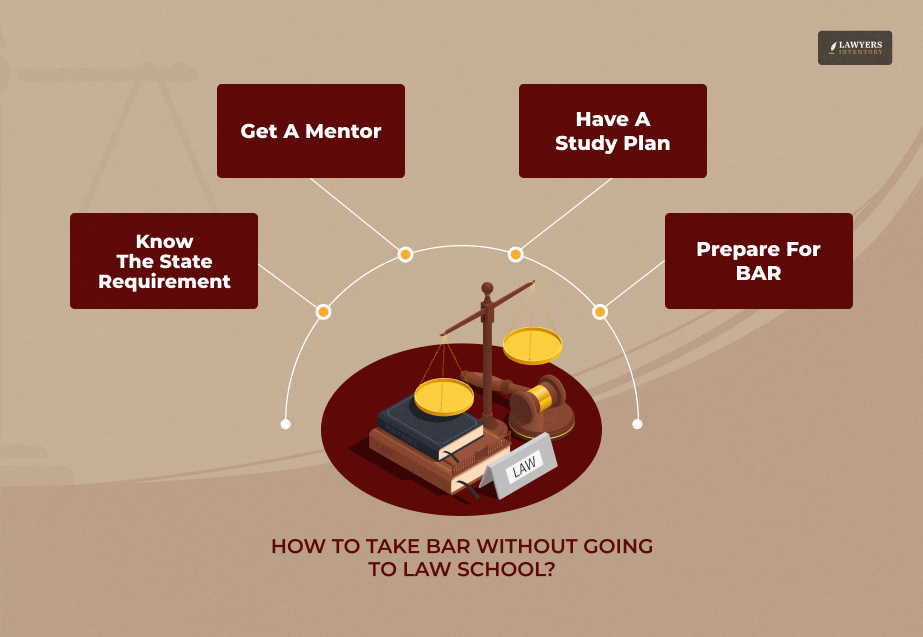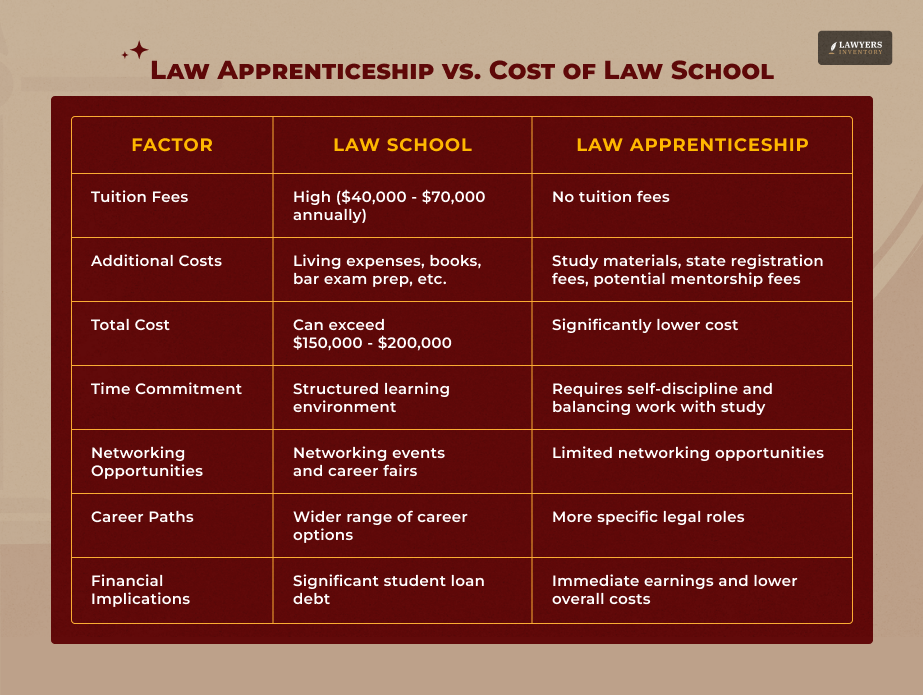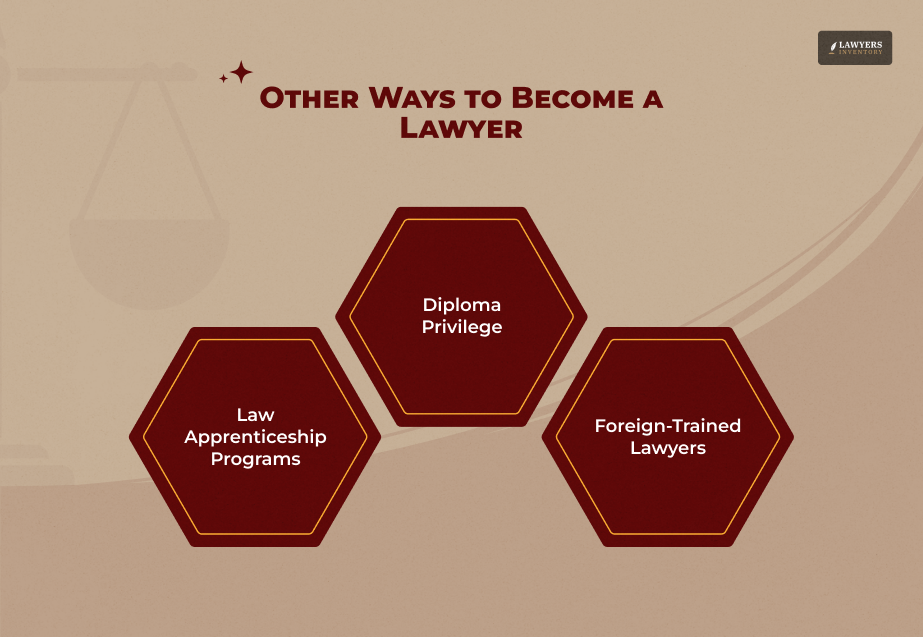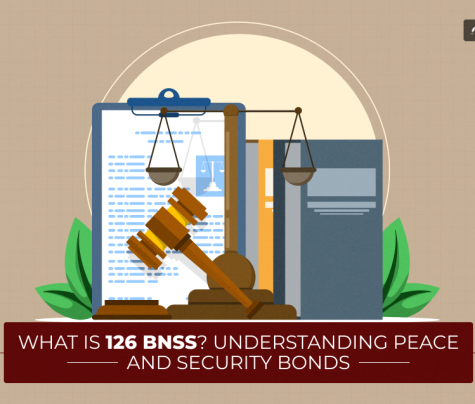
Can you take the bar without going to law school? This is a question that most people who want to become a lawyer but do not want to go through that financially strenuous process often ask.
Before answering this question, I want you to take a look at a few stats:
- Over 83,000 people sit for the bar exam annually in the United States.
- Nearly 40,000 law students graduate each year from accredited law schools.
- Yet, only four states allow individuals to take the bar exam without attending law school.
These statistics highlight a fascinating aspect of the legal profession. While most attorneys follow the traditional path of earning a Juris Doctor (JD) degree, a handful of aspiring lawyers take a less conventional route.
This alternative path, often referred to as “reading the law,” allows individuals to study under the supervision of a practicing attorney or judge instead of enrolling in law school.
But is skipping law school and still qualifying for the bar exam a good idea?
In this article, I will explain how it works, where it’s possible, and whether this approach might fit you.
Understanding the Bar Exam
The bar exam is crucial for anyone who dreams of becoming a licensed attorney.
It tests your knowledge of legal principles, ability to apply the law, and readiness to practice in a courtroom.
But before you can even take the exam, you must meet certain eligibility criteria and requirements, which vary depending on the state.
Bar Exam Eligibility
To sit for the bar exam, you would need to have a JD or Juris Doctor degree from an American Bar Association-accredited law school.
However, a few states—like California, Virginia, Vermont, and Washington—offer an alternative path. These states allow individuals to take the bar exam without attending law school.
Instead, you can pursue legal training through “reading the law,” where you apprentice under a practicing attorney or judge.
While this path can save you from hefty law school tuition, it’s not easy. Apprenticeships usually require several years of rigorous study, dedication, and consistent supervision. Even then, the bar exam itself remains just as challenging as for traditional law school graduates.
Bar Exam Requirements
Regardless of how you qualify, the bar exam has universal requirements. You’ll need to:
- Complete the required training: This means earning your JD for law school graduates. You must fulfill the specific study hours mandated by your state for apprentices.
- Pass the Multistate Professional Responsibility Examination (MPRE): This test ensures you understand the ethical standards expected of attorneys.
- Submit a character and fitness application: States thoroughly review your background to ensure you’re suited for the legal profession.
You can register for the bar exam and take a significant step toward becoming a licensed lawyer by meeting these requirements.
Can You Become a Lawyer Without Passing the Bar?
Becoming a lawyer typically requires passing the bar exam, but there are limited exceptions depending on your career goals and location.
While most states in the U.S. require passing the bar to practice law, there are some pathways to a legal career that don’t involve taking the exam.
For example, in Wisconsin, graduates of ABA-accredited law schools within the state can skip the bar exam through the Diploma Privilege system. This unique rule allows law school graduates to practice law immediately, provided they meet the state’s specific academic and ethics requirements.
Another exception involves alternative legal roles. Not everyone working in law needs to be a licensed attorney. You could work as a paralegal, legal consultant, or even a legal academic without ever taking the bar.
However, these roles don’t grant you the authority to represent clients in court or provide legal advice as a licensed attorney would.
Additionally, some corporate in-house legal positions don’t require bar membership if your role focuses on regulatory compliance, contracts, or policy work rather than litigation.
Similarly, legal tech careers are growing, and professionals often combine law with technology to develop software and systems that improve legal processes.
However, these exceptions are limited. Passing the bar remains essential if your ultimate goal is to represent clients in court or provide comprehensive legal counsel. This exam ensures that all attorneys meet a standard level of competence and professionalism, safeguarding the legal system and the public.
According to the National Conference of Bar Examiners (NCBE), in 2022, over 45,000 individuals passed the bar exam in the U.S.
This statistic underscores its importance as a rite of passage for aspiring lawyers. While there are alternatives, passing the bar remains the most recognized path to practicing law.
Can You Take the Bar WITHOUT Going to Law School?
Yes, taking the bar exam without attending some of the best law schools is possible, but this option is only available in a few states.
In the U.S., California, Virginia, Vermont, and Washington allow aspiring lawyers to bypass law school through a process known as “reading the law.”
This means you can study under the supervision of a licensed attorney or judge, following a structured apprenticeship program.
Instead of earning a Juris Doctor (JD) degree in these states, you gain hands-on legal experience while learning the law. For example:
- In California, apprentices must complete 18 hours of weekly study under an attorney or judge for four years, with mandatory progress reports submitted to the state bar.
- Vermont has a similar system but offers more flexibility regarding apprenticeship structure.
While this path may seem appealing—especially for avoiding the hefty cost of law school—it comes with challenges. The bar exam remains just as rigorous, and pass rates for apprentices tend to be lower than those for law school graduates.
For instance, according to the State Bar of California, only 12.5% of apprentices passed the bar exam in 2022, compared to nearly 40% of law school graduates.
Additionally, not all states recognize this pathway. If you choose the apprenticeship route, your ability to practice law may be restricted to the state where you took the bar.
Ultimately, while skipping law school is an option, it requires a lot of self-discipline, dedication, and commitment.
This path might work for you if you’re passionate about a hands-on learning experience and saving money. However, be prepared for an uphill journey demanding hard work and resilience.
How to Take the Bar Without Going to Law School?

While most aspiring lawyers follow the traditional path of attending law school, a few states offer an alternative route.
Known as “reading the law,” this process allows you to apprentice under a licensed attorney or judge and eventually take the bar exam.
If you’re considering this unconventional approach, here’s how it works step by step.
Understanding State Requirements
The first step is determining if your state allows you to take the bar without attending law school. Only California, Virginia, Vermont, and Washington permit this option. Each state has unique requirements:
- California: Requires four years of supervised study under a lawyer or judge. Register with the California State Bar and pass a first-year law student exam.
- Virginia: Mandates three years of apprenticeship under an attorney with at least 10 years of experience.
- Vermont: Requires legal study under a supervising attorney or judge for a specified period, with flexible study options.
- Washington: Demands four years of legal apprenticeship and completion of state-specific coursework.
Finding a Mentor
Once you meet your state’s eligibility criteria, securing a supervising attorney or judge is the next step. Your mentor must be a practicing lawyer with substantial experience (typically 10+ years).
They’ll guide your studies, teach you the nuances of legal practice, and ensure you meet state requirements. Building a strong relationship is key since they’ll track and report your progress.
Creating a Study Plan
Apprenticeship programs are rigorous, requiring a disciplined approach to legal study.
You’ll need to dedicate significant hours—up to 18 per week in California—studying legal subjects like contracts, torts, criminal law, and civil procedure.
You’ll also need to regularly report your progress to the state bar.
Preparing for the Bar Exam
The bar exam itself remains challenging, regardless of how you qualify. You’ll need to:
- Take the Multistate Professional Responsibility Exam (MPRE).
- Complete your apprenticeship hours.
- Study bar exam materials thoroughly, as apprentices often face lower pass rates than law school graduates.
Know About Cost of Law Apprenticeship vs. Cost of Law School

One of the main reasons people consider taking the bar without going to law school is the potential cost savings. Law school can be incredibly expensive, often leaving graduates with significant debt.
On the other hand, pursuing a law apprenticeship allows you to learn the law while working directly under an attorney, often at a fraction of the cost. Let’s talk about the financial differences between these two paths.
The Cost of Law School
Attending law school is a significant financial investment. On average, tuition for a three-year Juris Doctor (JD) program at an American Bar Association (ABA)-accredited law school ranges from $40,000 to $70,000 annually. Here’s a breakdown:
- Public Law Schools (in-state): Around $29,600 annually (source: U.S. News & World Report).
- Public Law Schools (out-of-state): Approximately $42,000 per year.
- Private Law Schools: Tuition can climb to $53,000 or more annually.
When you factor in living expenses, books, bar exam preparation courses, and other fees, the total cost of law school can exceed $150,000 to $200,000.
Most students rely on loans, leading to significant debt upon graduation. According to the American Bar Association, the average law graduate owes $130,000 in student loans.
The Cost of a Law Apprenticeship
A law apprenticeship, often called “reading the law,” is much more affordable. Here’s why:
- No Tuition Fees: Unlike law school, apprenticeships don’t charge tuition.
- Study Materials: You’ll still need to purchase textbooks and bar prep materials and cover state registration fees ranging from $500 to $2,000 annually.
- Mentorship Costs: In some cases, your supervising attorney may charge a small fee for their time and expertise. However, this is typically much lower than tuition costs.
While apprenticeships are cost-effective, they may come with opportunity costs. As an apprentice, you won’t receive the structured networking opportunities and on-campus recruitment law schools offer.
Additionally, juggling study hours and work can be demanding, potentially slowing your path to licensure.
So Which One Should You Choose?
If minimizing debt is a priority, a law apprenticeship can save you tens of thousands of dollars.
However, it requires immense self-discipline, motivation, and the willingness to forego the traditional law school experience.
Carefully weigh your goals, resources, and career aspirations before deciding which path is right for you.
States That Don’t Require Law School to Take the Bar Exam
If you’re considering skipping law school and still want to take the bar exam, there are only a few states in the U.S. where this is possible.
These states allow aspiring lawyers to become eligible for the bar through a legal apprenticeship program, often called “reading the law.”
The states that permit this are:
- California: California is the most popular state for those pursuing this alternative route. You must complete a four-year supervised apprenticeship under a practicing attorney or judge. You’ll also need to pass the First-Year Law Students’ Examination (commonly called the “Baby Bar”) after your first year of study.
- Virginia: In Virginia, you can take the bar exam after completing a three-year apprenticeship under an experienced lawyer. The program must follow specific guidelines the Virginia Board of Bar Examiners set.
- Vermont: Vermont offers flexibility in its requirements, allowing apprentices to train under a judge or attorney. The program length varies depending on your previous legal education or experience.
- Washington: Washington State has a four-year law clerk program where you train under a qualified attorney. It includes practical work and mandatory coursework.
Though the rigorous process requires dedication, these states provide a cost-effective and hands-on way to prepare for the bar.
Alternative Paths to Becoming a Lawyer

Becoming a lawyer without following the traditional law school route is rare, but it’s not impossible.
Depending on your state and circumstances, several alternative paths can help you achieve your goal. These options are particularly appealing to those who want to avoid the high cost of law school or prefer hands-on experience over classroom learning.
1. Law Apprenticeship Programs: You can earn a spot on the bar exam by completing a legal apprenticeship in states like California, Virginia, Vermont, and Washington. This entails learning under the supervision of a judge or active lawyer. Despite being less expensive, this route necessitates a great deal of commitment, self-control, and regular progress reports to the state bar.
2. Diploma Privilege: Wisconsin exempts graduates of the state’s ABA-accredited law schools from taking the bar test. As long as they fulfill all other licensing requirements, law school graduates are eligible to practice law right away under this special provision, known as the Diploma Privilege.
3. Foreign-Trained Lawyers: After completing extra coursework at an ABA-accredited institution, foreign-trained attorneys are permitted to sit for the bar test in some states, including New York.
These alternative routes aren’t for everyone. However, they can be excellent options for those willing to commit to non-traditional legal training and hard work.
Should You Take the Bar Without Going to Law School?
You can take the bar without going to law school, that’s for sure! However, there are a few things that you should keep in mind.
It is a very personal decision to decide whether to take the bar and practice law without attending law school. Although you can save time and money by taking this alternate path, certain special difficulties should be carefully considered.
The substantial cost savings are among the main benefits. The cost of attending law school can surpass $150,000, leaving many graduates with large student loan debt.
You can learn the law through practical experience working under a certified attorney by pursuing a law apprenticeship, frequently at a far lower price.
Additionally, this option enables you to acquire practical legal knowledge that may not be available through regular classroom instruction.
But not everyone chooses to bypass law school. Apprentices typically have lower success rates than law school graduates on the famously difficult bar exam.
In California, for example, compared to roughly 40% of law school graduates, only around 12.5% of apprentices passed the bar in previous years. Without the organized assistance of a law school, you will have to rely mostly on your own drive and self-control.
Furthermore, you may not be able to practice law elsewhere because this path is only offered in a few states. This could be a lucrative choice if you’re willing to put in the effort and achieve the requirements.
Read Also:
- Lawyer Salary Around the World: Where Do Lawyers Earn the MOST?
- Highest Paid Lawyers Whose Salary and Field Will SHOCK You!
- Solicitor Vs Barrister: What’s The Difference?



![Understanding The Pay Transparency Law Of Massachusetts [2026 Guide]](https://lawyersinventory.com/wp-content/uploads/2026/02/massachusetts-pay-transparency-law-100x100.png)







0 Reply
No comments yet.